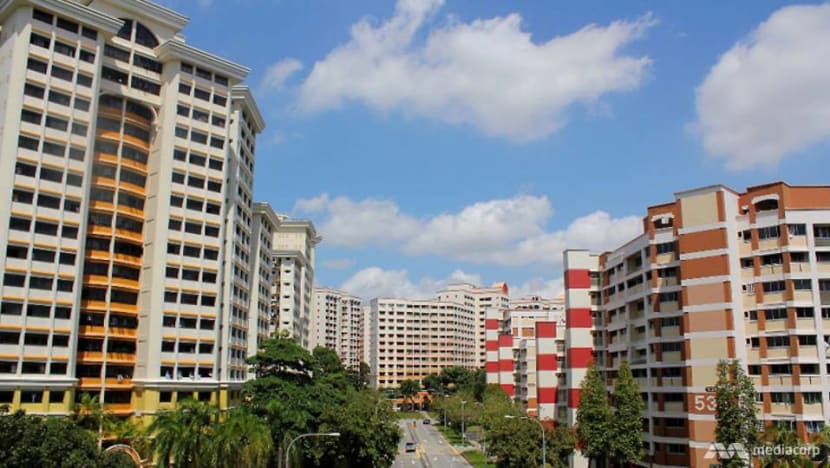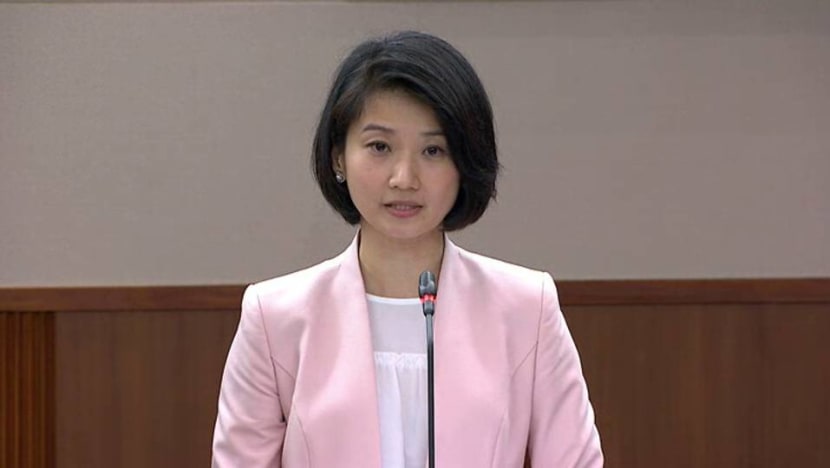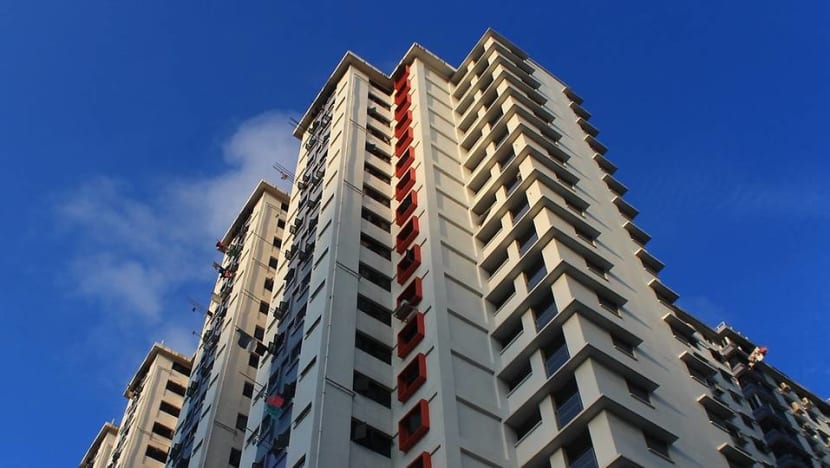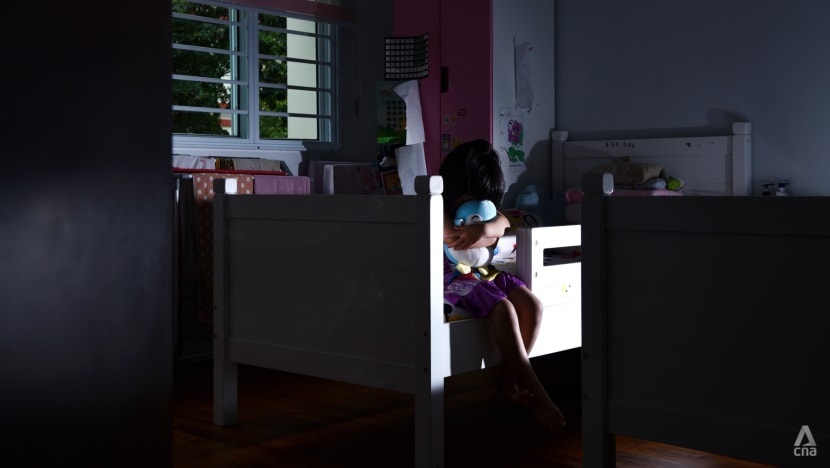commentary Commentary
Commentary: The road to housing for single, unwed mothers is clearer but still bumpy
Housing is arguably the most fundamental practical issue that unwed mothers must deal with, says Shailey Hingorani, Head of Research and Advocacy at AWARE.

File photo of HDB flats. (Photo: Hester Tan)
SINGAPORE: International Women’s Day offers an opportunity to evaluate the extent to which socio-economic and other gaps between men and women have narrowed.
But any true vision of gender equality must also consider differences between women – including the difference between married and unmarried mothers.
Unwed mothers face a double disadvantage: They single-handedly bear not only the typical burden of motherhood, but also the stigma and tribulations of being unmarried in a society that encourages a mainstream definition of parenthood (i.e. within marriage).
Single parenthood also sees one person take on an incredibly heavy responsibility meant for two.
Some changes are afoot. The Ministry of National Development has announced on Wednesday (Mar 4) that single, unwed parents over the age of 21 can now also buy a 3-room flat in a non-mature estate from HDB, compared to a 2-room flat previously.
These moves are encouraging. Yet more can and should be done to improve housing access, arguably the most fundamental practical issue that unwed mothers and their children face.
As the Government has expressed, it’s a national imperative to give every child a headstart in life, whether with affordable quality childcare, education or otherwise. Stable housing should surely be part of that social compact.
READ: Commentary: How helping at home benefited my wife, our children and even me
READ: Commentary: A look at HDB flat affordability after recent housing policy moves
THERE HAS BEEN PROGRESS
MPs, activists, social workers and single parents themselves have been instrumental in moving Singapore toward greater compassion for unwed mothers.
Whereas in the early 1990s, the Government argued that a conservative society like Singapore did not “accept” unwed motherhood, in 2019, the Ministry of National Development indicated that all mothers are equal, and that all unwed mothers, regardless of age, were welcome to apply for HDB housing.
"Single unwed parents and their children are our valued citizens. We are committed to do better,” Senior Parliament Secretary for National Development Sun Xueling said in September 2019, in response to MP Louis Ng’s adjournment motion, in which he called for more to be done for single unwed parents.
“I want single unwed parents to know that we share their desire to ensure the well-being of their child, and we will try our best to support them.”

Several other notable policy changes have resulted in unwed mothers being treated on par with their married counterparts. For example, in 2013, paid childcare leave was extended to unwed mothers. In 2016, Child Development Accounts – special savings accounts for education and medical expenses – were made accessible to children born out of wedlock.
The same year also saw paid maternity leave for unwed mothers increase from eight to 16 weeks, which is now equal to the entitlement provided to married mothers.
We should celebrate these changes, which provide very real material benefits to mothers in caring for their children.
That said, some public policies still show bias towards parenthood outside of marriage – such as tax rebates for childbirth, Working Mother’s Child Relief and the enhanced Baby Bonus cash gift.
Commentary: Why do parents still pay top dollar for pre-schools when there are more affordable options?
READ: Commentary: 'Super mums' have one simple request. Don’t hinder them from returning to work
ACCESS TO GRANTS STILL IMPEDED
Housing is not just about a roof over your head. Unreliable housing seriously undermines a mother’s ability to stay employed, to protect her children from abuse, and to have the time and space to plan for her family’s future.
Wednesday’s announcement – that HDB would accept applications from all unwed parents for up to a 3-room flat, in addition to resale flats – will certainly ameliorate the situation for those who can afford such flats.
However, Parliament had previously revealed, in response to a question from Mr Ng, that the median monthly employment income for unwed mothers below the age of 35 is S$600. Most, therefore, are likely to need subsidies, so their choice of housing will still be limited despite this change.
HDB policy also does not allow unwed, single parents and their children to count as a “family nucleus”, which would make them eligible for flats and housing grants under the Families Grant scheme.

ACCESS TO HOUSING REMAINS UNCERTAIN
More broadly, although the changes now provide more options and have lowered the age of eligibility, single mothers will still need to make these requests through HDB where their needs will be assessed, or through their MPs, rather than through the usual sales channels.
Requests for rental housing also remains on a case-by-case basis. Mr Ng’s appeal for MND to define objective criteria on how housing applications get evaluated was also rejected on grounds that each case is unique, and that the Government needs to exercise maximum flexibility.
Our experience tells us that such an approach has historically failed to meet the housing needs of unwed mothers.
National-level data shared in Parliament reveals that when it comes to rental housing applications from single unwed parents, rejections outnumber approvals. From 2014 to May 2019, MND has only approved 380 rental applications out of the 1,014 requests received.
Similarly, from 2014 to 2016, only about 20 per cent of the 100 single, unwed mothers under 35 who appealed to buy a flat had their applications approved.
READ: Pregnant and alone: In Malaysia, social stigma forces unwed mothers to give up babies
SUPPORT, HOUSING AND ENABLEMENT
Since 2018, AWARE has run the Support, Housing and Enablement (S.H.E.) Project, which currently provides free housing for two years to single-mother families. Of these mothers, one-third are unmarried mothers under the age of 35.
They all come from unstable housing backgrounds, either living in transitional shelters or moving house to house because no family member was willing to provide shelter for long enough. They have little or no family support, and often put up with familial abuse in order to continue living with family.

One of the mothers, Nurul*, told us that her prior living arrangement with her brother was untenable because he was easily angered and frequently resorted to physical abuse. Once, he hit her daughter while she was sleeping and caused her nose to bleed. Another time, he threatened to beat her for staring at him.
Staying at S.H.E. has allowed Nurul to concentrate on finding full-time employment. Her relationship with her family has improved because they are not crowded into the same small space anymore. Her child is growing up in an emotionally stable environment, free from abuse.
After MND openly invited unwed parents to apply for housing last year, one of the S.H.E. mothers managed to secure rental housing; she now plans to move out of S.H.E. The others are still struggling because of their unmarried status.
READ: Commentary: A deep pain but strong will to live - lessons from a survivor of abuse
WHY NOT EQUALISE BENEFITS?
A roadmap towards housing equality for all mothers could look like this: An unwed mother and her children would count as a family nucleus, enabling them to apply for public housing under the Families Scheme.
And overall, unwed parents, whether the children end up with the father or mother, would have access to housing as a matter of policy and not on a case-by-case basis. There would be a separate scheme for those under the age of 35 to apply for 2- or 3-room flats (similar to the existing Orphans or Joint Singles Scheme).
The struggle for a life free from discrimination and social stigma is far from over for these mothers. As a caring and inclusive society, this International Women’s Day, let us pledge to extend the same benefits to all mothers regardless of their marital status.
Shailey Hingorani is Head of Research and Advocacy at AWARE.














